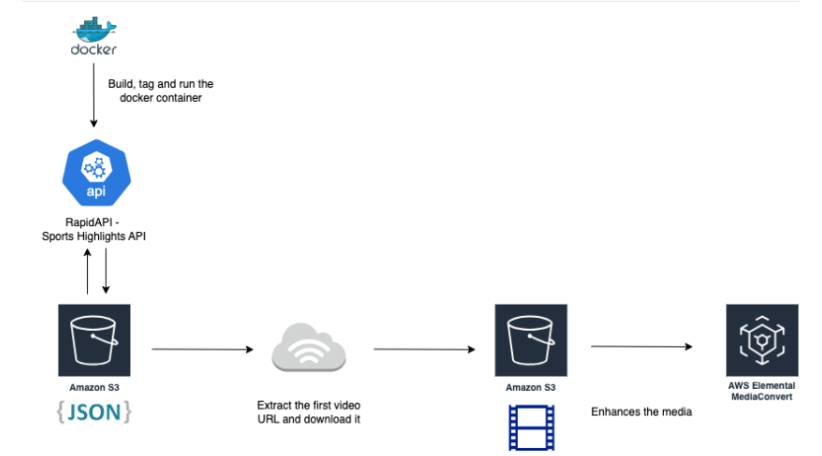Overview
NCAA Game Highlights – Project #5 is a containerized pipeline designed to fetch NCAA game highlights via RapidAPI, process video content using AWS MediaConvert, and provision all required AWS infrastructure with Terraform. This project demonstrates a complete end-to-end solution combining Docker containerization, AWS services, and Infrastructure as Code (IaC).
Project Features
- RapidAPI Integration: Accesses NCAA game highlights from a free-tier Sports Highlights API.
- Video Processing: Downloads video URLs from the API, stores metadata in S3, and uses AWS MediaConvert to transcode videos.
- Containerized Pipeline: Runs the entire workflow inside a Docker container for consistent deployments.
- Terraform Automation: Provisions AWS resources (VPC, S3, IAM, ECR, ECS, etc.) via Terraform.
- Secure Configuration: Manages sensitive keys and configurations using environment variables and AWS Secrets Manager.
Tools & Technologies
- Programming Language: Python 3
- Containerization: Docker
- Infrastructure as Code: Terraform
- Cloud Services: AWS (S3, MediaConvert, ECS, IAM, ECR, CloudWatch, etc.)
- API Integration: RapidAPI (Sports Highlights API)
- Secrets Management: AWS Secrets Manager
Project Archetectur diagrm

File Structure
src/
├── Dockerfile # Instructions to build the Docker image
├── config.py # Loads environment variables with sensible defaults
├── fetch.py # Fetches NCAA highlights from RapidAPI and stores metadata in S3
├── mediaconvert_process.py # Submits a job to AWS MediaConvert to process a video
├── process_one_video.py # Downloads the first video from S3 JSON metadata and re-uploads it
├── run_all.py # Orchestrates the execution of all scripts
├── requirements.txt # Python dependencies for the project
├── .env # Environment variables (API keys, AWS credentials, etc.)
└── .gitignore # Files to exclude from Git
terraform/
├── main.tf # Main Terraform configuration file
├── variables.tf # Variables
├── secrets.tf # AWS Secrets Manager and sensitive data provisioning
├── iam.tf # IAM roles and policies
├── ecr.tf # ECR repository configuration
├── ecs.tf # ECS cluster and service configuration
├── s3.tf # S3 bucket provisioning for video storage
├── container_definitions.tpl # Template for container definitions
├── terraform.tfvars # Variables used in the Terraform configuration
└── outputs.tf # Outputs from Terraform
Prerequisites
Before getting started, ensure you have:
- RapidAPI Account: Sign up at RapidAPI and subscribe to the Sports Highlights API.
- Docker Installed: Verify with
docker --version. - AWS CLI Installed: Confirm installation with
aws --versionand configure with valid credentials. - Python 3 Installed: Check with
python3 --version. - AWS Account: With valid IAM access keys and an AWS Account ID.
Environment Configuration
1. Create the .env File for Local Runs
In the project root (or within the src directory), create a file named .env and update the placeholder values:
# .env
API_URL=https://sport-highlights-api.p.rapidapi.com/basketball/highlights
RAPIDAPI_HOST=sport-highlights-api.p.rapidapi.com
RAPIDAPI_KEY=your_rapidapi_key_here
AWS_ACCESS_KEY_ID=your_aws_access_key_id_here
AWS_SECRET_ACCESS_KEY=your_aws_secret_access_key_here
AWS_DEFAULT_REGION=us-east-1
S3_BUCKET_NAME=your_S3_bucket_name_here
AWS_REGION=us-east-1
DATE=2023-12-01
LEAGUE_NAME=NCAA
LIMIT=5
MEDIACONVERT_ENDPOINT=https://your_mediaconvert_endpoint_here.amazonaws.com
MEDIACONVERT_ROLE_ARN=arn:aws:iam::your_account_id:role/YourMediaConvertRole
INPUT_KEY=highlights/basketball_highlights.json
OUTPUT_KEY=videos/first_video.mp4
RETRY_COUNT=3
RETRY_DELAY=30
WAIT_TIME_BETWEEN_SCRIPTS=60
2. Create the terraform.tfvars File
Within the terraform directory, create a file named terraform.tfvars and update it with your configuration:
# terraform.tfvars
aws_region = "us-east-1"
project_name = "your_project_name_here"
s3_bucket_name = "your_S3_bucket_name_here"
ecr_repository_name = "your_ecr_repository_name_here"
rapidapi_ssm_parameter_arn = "arn:aws:ssm:us-east-1:xxxxxxxxxxxx:parameter/myproject/rapidapi_key"
mediaconvert_endpoint = "https://your_mediaconvert_endpoint_here.amazonaws.com"
mediaconvert_role_arn = ""
# Optionally, specify your custom MediaConvert role ARN here.
retry_count = 5
retry_delay = 60
Replace placeholder values with your actual configuration details.
Setup & Deployment
Local Development
1. Clone the Repository:
git clone https://github.com/kingdave4/NCAA_GamehighLight.git
cd NCAA_GamehighLight/src
2. Add Your API Key to AWS Secrets Manager: Store your RapidAPI key securely
aws secretsmanager create-secret \
--name my-api-key \
--description "API key for accessing the Sports Highlights API" \
--secret-string '{"api_key":"YOUR_ACTUAL_API_KEY"}' \
--region us-east-1
3. Update File Permissions: Secure your .env file:
chmod 600 .env
4. Build & Run the Docker Container:
docker build -t highlight-processor .
docker run -d --env-file .env highlight-processor
The container will execute the pipeline: fetching highlights, processing a video, and submitting a MediaConvert job.
Verify the output files in your S3 bucket (e.g., JSON metadata, raw videos, and processed videos).
Deploying to AWS with Terraform
1. Provision AWS Resources: Navigate to the terraform directory:
cd terraform
terraform init
terraform validate
terraform plan -var-file="terraform.tfvars"
terraform apply -var-file="terraform.tfvars" -auto-approve
Terraform will provision the necessary AWS resources such as VPC, S3 bucket, IAM roles, ECR repository, ECS cluster, and more.
2. Deploy Docker Image to AWS ECR:
aws ecr get-login-password --region us-east-1 | \
docker login --username AWS --password-stdin <AWS_ACCOUNT_ID>.dkr.ecr.us-east-1.amazonaws.com
docker build -t highlight-pipeline:latest .
docker tag highlight-pipeline:latest <AWS_ACCOUNT_ID>.dkr.ecr.<REGION>.amazonaws.com/highlight-pipeline:latest
docker push <AWS_ACCOUNT_ID>.dkr.ecr.<REGION>.amazonaws.com/highlight-pipeline:latest
3. Clean-Up: When needed, remove all provisioned AWS resources:
terraform destroy -auto-approve
Challenges & Troubleshooting
Challenges Overcome
ECS Task Restart Loop: The ECS service was initially caught in a restart loop due to configuration or application errors. Adjustments in the task definitions and error handling resolved the issue.
IAM PassRole Permission for MediaConvert: ECS tasks encountered permission issues with AWS MediaConvert due to missing iam:PassRole permissions. This was fixed by refining IAM roles and policies.
Troubleshooting Tips
ECS Task Failures: Check the ECS console for stopped task reasons and exit codes to diagnose issues.
MediaConvert Permission Errors: Ensure the IAM roles associated with ECS tasks include the necessary permissions, such as iam:PassRole.
Key Takeaways
- Leveraged containerization (Docker) for a consistent and portable pipeline.
- Integrated multiple AWS services (S3, MediaConvert, ECS) to build a robust media processing workflow.
- Automated infrastructure provisioning using Terraform.
- Emphasized secure configuration management via environment variables and AWS Secrets Manager.
Future Enhancements
- Expand Terraform scripts to provision additional AWS resources.
- Increase concurrent video processing capabilities.
- Transition from static date queries to dynamic time ranges.
- Improve logging and error handling for enhanced observability.
📁 Repository
GitHub - kingdave4/AzureDataLake
📬 Contact
For questions, feedback, or opportunities, feel free to connect on LinkedIn or drop me a message through the contact form.